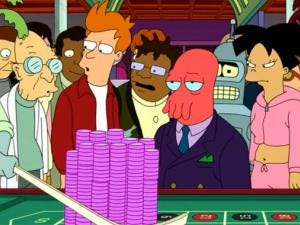So What, Who Cares (vol 2, issue 109) How sleeplessness is costing you money

Hello! I could not stop grinning once I read about the Metropolitan Water District of Southern California's latest attempt to raise drought awareness: a Pandora playlist to help customers take five-minute showers, featuring hits like Adele's "Set Fire to the Rain" and "Water Runs Dry" by Boyz II Men. Do any of you shower to the hits? What's on your preferred bathtime playlist? Suggestions welcome via email or Twitter.
A quick programming reminder: I will be taking an end-of-summer break from So What, Who Cares? from August 24 to September 4, but will mark la rentrée with a Labor Day issue on September 7.
*

If you sleep more, you make more. So report economists Matthew Gibson and Jeffrey Shrader, who were curious as to how time zones affected economic productivity. They looked at two cities on either edge of a time zone change and found that inhabitants of a western city still got up at the same time as their counterparts in the city that was on an hour-earlier time zone -- but because of the "extra" hour of sunlight, the western residents went to bed later. Once they established this, they looked at what the sleep-less crowd was making:
Gibson and Shrader looked at the wage data in places like this, to see how an extra dose of sleep affects wages, and found that permanently increasing sleep by an hour per week for everybody in a city, increases the wages in that location by about 4.5 percent.
So what? The connection between wages and sleep may come down to cognitive ability. Most people who only get five to six hours of sleep per night are not capable of bringing their A game:
Stay awake longer than 18 consecutive hours, and your reaction speed, short-term and long-term memory, ability to focus, decision-making capacity, math processing, cognitive speed, and spatial orientation all start to suffer. Cut sleep back to five or six hours a night for several days in a row, and the accumulated sleep deficit magnifies these negative effects.
If you can't think clearly, not only are putting yourself at risk, you could present a public safety hazard (if your job entails operating heavy machinery or public transit) or a security risk.
Who cares? Good managers should care: employees who can't think straight aren't likely to make good business decisions.

Health insurers should -- poor sleep can suppress your immune system, leading to an increase risk of infection or sustained sickness, and that can get pricey to treat. A lack of sleep also raises the risk of heart attack or stroke which, again, can be costly to treat (or to pay out in life insurance policies). And a lack of sleep can muck with the hormonal cues that control appetite, boosting food cravings while reducing the ability to metabolize glucose. As a result, sleep-deprived people crave carbs and put on weight; some health experts have linked America's sleep deficit to its rising obesity rates.
And there's increasing evidence that the brain relies on sleep to clear out the toxins that can lead to a build-up of beta amyloid, i.e. the substance responsible for producing the sticky gunk found in the brains of Alzheimer's patients. So it's in the best interest of insurers to push sleep as a cost-cutting, health-boosting measure.
Corporate insurance agencies should also care because sleep-deprived employees generate risks that will have to be paid out: If you can't think clearly, not only are putting yourself at risk, you could present a public safety hazard (if your job entails operating heavy machinery or public transit) or a security risk.

On the commercial front, app and wearables folks are already colonizing this space so people can quantify their sleep and hack it as needed. Given the increasing drumbeat to ban mobile devices from the bedroom and to stop looking at screens for an hour before bed, I look forward to seeing the products that are marketed specifically to address these concerns.
Additional reading: I've covered sleep deprivation and its cascading side effects before: vol 1, issue 1; vol 2, issue 2; vol 2, issue 4; vol 2, issue 24.
How's your sleep? Have you made any changes to it? What did you notice after you made those changes? Share your anecdata with me via email or Twitter.
*
Your pop-culture note of the day: ... will return. I am podcasting like a madwoman this week: a recording of Phil and Lisa Ruin the Movies last night; a recording of Random Trek tomorrow; a recording of the final round of the Superhero Spectacular on Thursday (parts one a, b, c, d and part two of our NCAA-style tournament of heroes here); and a delayed recording of a nerd books rundown on Friday (reading list here). So I've been boning up for those events. Please feel free to stalk the Incomparable's general show page for other appearances.
*
A NEW MONTH, A NEW FOOTER: Here's a free and easy way to show people you like them -- send them here to subscribe to So What, Who Cares? You can plumb the archives here. You can always reach out to me via Twitter or email. You can go where you want to/ to a place they'll never find/ and we can act like we come from out of this world/ and leave the real one far behind.

